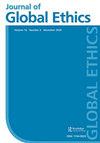Relational value, land, and climate justice
Q2 Arts and Humanities
引用次数: 0
Abstract
ABSTRACT This article draws on the insight that people and communities have fundamental relationships with place. People are defined and shaped by place; and place is, in turn, defined and shaped by communities of people. Insofar as climate change changes the nature and experience of place, it can undermine the relationship between people and place, and thereby has the potential to affect the identity of either or both. A place, or the land, may change any one of its fundamental characteristics in a variety of ways, and in so doing, may fundamentally transform its identity. Whereas the paradigmatic injustice of climate change has often been described primarily in terms of spaces that cease to be habitable such as island nations lost to rising sea levels, changing climatic characteristics are also known to result in desertification, destabilized rainfall patterns, shifts in migratory patterns, extinction of species, loss of biodiversity, erosion, increased fire risk, and other large-scale changes to the land that remains. A relational understanding of climate change reveals the harms of climate change to be both much more fundamental, and much more ubiquitous.关系价值、土地和气候正义
摘要这篇文章从人们和社区与地方有着根本关系这一观点出发。人是由地方来定义和塑造的;而地方又是由人的社区来定义和塑造的。只要气候变化改变了地方的性质和体验,它就会破坏人与地方之间的关系,从而有可能影响其中一方或双方的身份。一个地方或土地可能会以各种方式改变其任何一个基本特征,这样做可能会从根本上改变其身份。尽管气候变化的典型不公正性通常主要以不再适合居住的空间来描述,例如因海平面上升而失去的岛国,但众所周知,气候特征的变化也会导致荒漠化、降雨模式的不稳定、迁徙模式的转变、物种灭绝、生物多样性的丧失、侵蚀、火灾风险的增加,以及对剩余土地的其他大规模变化。对气候变化的关系理解揭示了气候变化的危害更为根本,也更为普遍。
本文章由计算机程序翻译,如有差异,请以英文原文为准。
求助全文
约1分钟内获得全文
求助全文

 求助内容:
求助内容: 应助结果提醒方式:
应助结果提醒方式:


